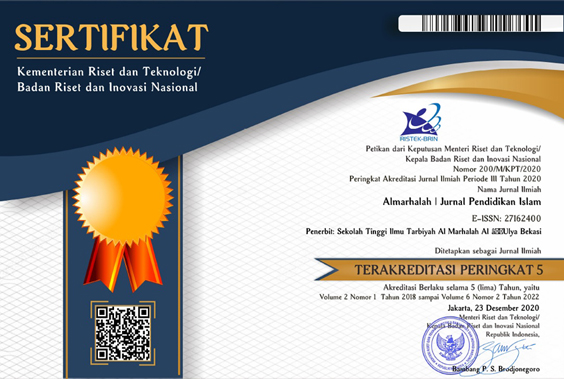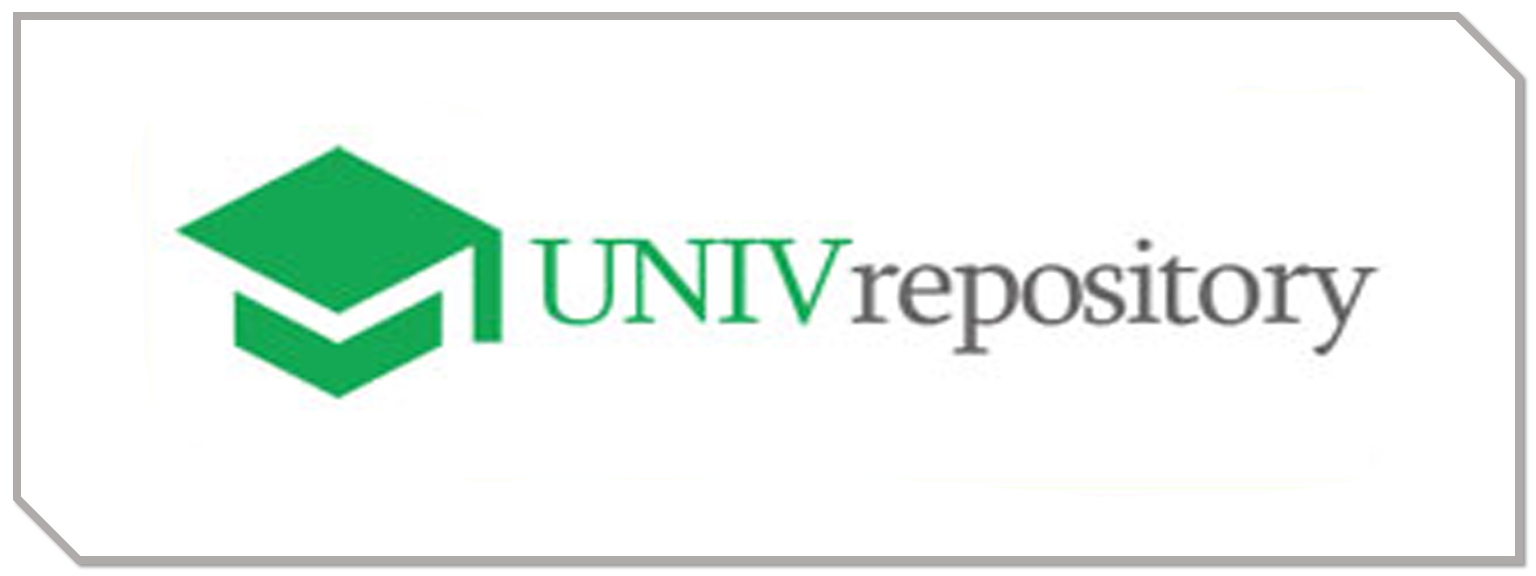PEMIKIRAN TAUHID SYEKH MUHAMMAD MUHAJIRIN AMSAR ADDARY DALAM KITAB KARANGANNYA SYARH ALA MATN AL JAUHAROH
DOI:
https://doi.org/10.38153/almarhalah.v8i2.126Keywords:
Keywords: Tawheed, Jauharoh At Tawheed, Ahlu Sunnah Wal Jamaah.Abstract
ABSTRACT
Imam Al-Ghazali said that the most important thing as an essential capital to worship Allah is a deep understanding of religion. In fact, such understanding is a pillar of religion. The series of tawhid, faith, and sharia are reflected in civilized humans in this mortal life. Mistakes in understanding the study of monotheism are influenced by the process of getting information very quickly in modern times, which must be balanced with the ability to filter information and the correct sources of knowledge. The thoughts of previous scholars who were qualified in their knowledge are things that still continue and need to be studied and used as the main reference in the right of monotheism. Sheikh Muhammad Muhajirin wrote his thoughts based on his knowledge, which he got from teachers with a chain of transmission that was connected to the Prophet; the book of Matan Jauharoh is a work of tawhid from the famous scholar Sheikh Ibrahim Al-Laqoni, whose book has been studied and used as a reference in studying the science of tawhid. This research was conducted with a qualitative approach, with the Critical Discourse Analysis method; according to Fairclough, AWK focuses discourse attention on language, using discourse points to the use of language as a social practice more than individual activities or to reflect something. It aims to find out Sheikh Muhammad Muhajirin's thoughts on the study of tawhid, which he expressed in Syarh Ala Matn Jauharoh, in relation to discourse, practice, and his role in the study of tawhid. The results showed that Sheikh Muhammad Muhajirin's thoughts on the study of monotheism can be seen from the detailed explanation of each stanza he quoted, which he then reflected in the daily education process he carried out both to his students and the surrounding community.
References
Aiz, M. (2023). BIOGRAPHY Syaikh KH Muhammad Muhajirin (Vol. 1). Al-Hanin Press. https://www.researchgate.net/profile/Muhammad-Aiz
al-Barry, M. D. Y., & Yacub, L. L. S. (2003). Kamus Istilah Popular. Target Press.
Asy’ari, K. H. H. (2021). Adabul ’Alim Wal Muta’allim. Maktabah At-Turmusy Litturats.
Azhari, S. (2008). Ensiklopedia Hisab Rukyat (1st ed.). Pustaka Pelajar.
Direktorat Urusan Agama Islam & Pembinaan Syariah. (2013). Ilmu Falak Praktik (1st ed.). Kementerian Agama.
F, Y. A., Syahriani, I., & Saifullah, A. R. (2021). Analisis Wacana Kritis terhadap Berita Perusakan Kantor Desa Bojong Koneng di Media Online. RIKSA BAHASA, XV.
Fatah, M. H. (2021). Tauhid Sebagai Dasar Pengembangan Ilmu Pengetahuan. OSF Preprints, 1(1).
Fauzan, U. (2023). Responding to Western Islamophobia through Religious Moderation in Indonesia: Fairclough and Wodak’s Critical Discourse Perspectives. Journal of Namibian Studies: History Politics Culture, 33. https://doi.org/10.59670/jns.v33i.588
Fauziyah, N. L., Nabil, & Syah, A. (2022b). Analisis Sumber Literasi Keagamaan Guru PAI Terhadap Siswa Dalam Mencegah Radikalisme Di Kabupaten Bekasi. Edukasi Islami: Jurnal Pendidikan Islam, 11, 503–517.
Fazlurrahman, L. M. (2022). Syekh Yasin Al-Fadani Dan Islam Nusantara. IJERT: Indonesian Journal of Education Research and Technology, 2(2).
Hamdan. (2019). Wacana dalam Perspektif Norman Fairclough. Jurnal Komodifikasi, 7(1).
Hendri. (2017). Fenomena Fajar Shadiq Penanda Awal Waktu Shalat Subuh, Terbit Matahari, Dan Awal Waktu Dhuha. ALHURRIYAH: Jurnal Hukum Islam, 02(02).
Islam, Md. T. (2021). The Religious Philosophy of Abdullah ibn Muhammad Al-Habashi Al-Harari and the Doctrines and Politics of Al-Ahbash: an Evaluation. International Journal of Interreligious and Intercultural Studies, 4(2). https://doi.org/10.32795/ijiis.vol4.iss2.2021.755
Kholilurrohman, Dr. H., A., M., Press, N. H., & Qalby, F. A. (2020). BUKAN HURUF BUKAN SUARA BUKAN BAHASA: Teologi Ahlussunnah Wal Jama’ah Tentang Sifat Kalam Allah. NURUL HIKMAH PRESS. https://books.google.co.id/books?id=bgr-DwAAQBAJ
Khotib, A. (2020). Kiprah Dakwah Bi Al-Qalam Dan Bi Al-Lisan Syaikh Muhajirin Amsar Al-Dary. Almarhalah | Jurnal Pendidikan Islam, 4(1). https://doi.org/10.38153/alm.v4i1.25
Lestari, P. (2022). Tradisi Penulisan Dan Pengajaran Kitab Pesantren: Proses Membangun Otoritas Dalam Kitab Kuning. Jurnal Kajian Islam Interdisipliner, 7(2). https://doi.org/10.14421/jkii.v7i2.1331
Marpaung, W. (2015). Pengantar Ilmu Falak (1st ed.). Kencana.
Nani Fitriono, E., & Aldias Zakariah, Y. (2024). Pentingnya Pembelajaran Ilmu Kalam Untuk Membentuk Pola Pikir Mahasiswa STIT Ibnu Khaldun Nunukan. Rayah Al-Islam, 8(1). https://doi.org/10.37274/rais.v8i1.933
Senin, N., Hambali, K. M. K., Ramli, W. A. W., Misra, M. K. A., & Ismail, N. (2023). Anthropomorphism according to Al-Ghazali (d. 1111) and Maimonides (d. 1204): A comparative discourse. HTS Teologiese Studies / Theological Studies, 79(1). https://doi.org/10.4102/HTS.V79I1.8264
Shamsuddin, S. S. S. (2019). Integrasi Ilmu Usul Fiqh, Usuluddin Dan Mantik Dalam Karya Akidah Jawi Untuk Memahami Nas-nas Mutasyabihat: Tinjauan Terhadap Kitab Risalah Manhaj Ahli Sunnah Oleh Tuan Guru Haji Abdul Qadir Bin Wangah. Sains Insani, 4(2), 1–16. https://doi.org/10.33102/jsi2019.4.2.01
Sholikhati, N. I., & Mardikantoro, H. B. (2017). Analisis Tekstual dalam Konstruksi Wacana Berita Korupsi di Metro TV dan NET dalam Perspektif Analisis Wacana Kritis Norman Fairclough. Seloka; Jurnal Pendidikan Bahasa Dan Sastra Indonesia, 6(2).
wal Jamaah, T. P. P. D. A. (1999). Allah Ada Tanpa Tempat (1st ed., Vol. 1). Ponpes Dar Ahlussunnah wal Jamaah Press.
Downloads
Published
Issue
Section
License
Copyright (c) 2024 Wathroh Mursyidi

This work is licensed under a Creative Commons Attribution-NonCommercial-ShareAlike 4.0 International License.









